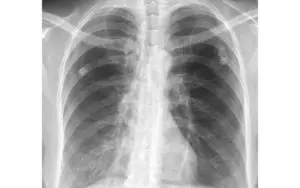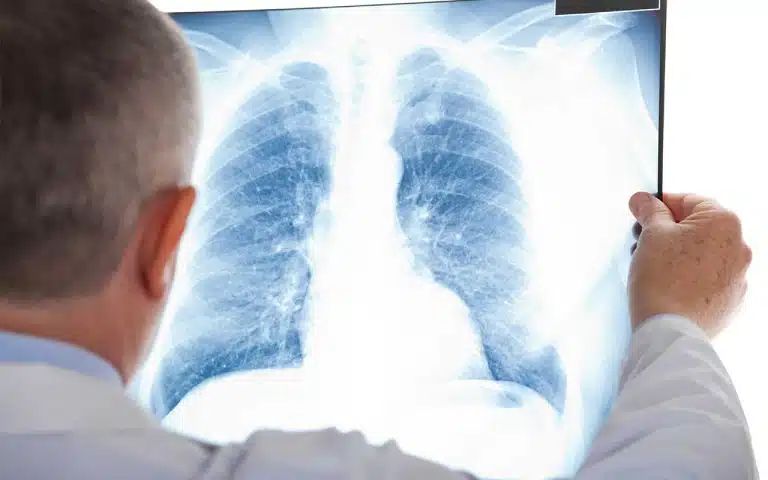Crack cocaine (also called freebase cocaine) is a highly addictive illicit drug that causes a rush of energy and euphoria (intense happiness). In the United States, most people who use the drug smoke it in a pipe.
Crack cocaine use poses a number of serious health risks, including paranoia, seizures, addiction, and overdose. In addition, smoking crack can cause a condition known as crack lung.
What Is Crack Lung?
Like all forms of smoking, crack cocaine smoking irritates your lungs. Also, according to toxicology reports, crack often contains additives that can further irritate your lungs, such as marijuana, heroin, caffeine, and laundry detergent.
That’s why people who smoke crack face a high prevalence of acute pulmonary syndrome (lung disease), which is often called “crack lung.”
Crack lung usually occurs within 48 hours of smoking crack. It can cause various types of pulmonary (lung) damage, including:
- diffuse alveolar damage (damage to the alveoli, which are tiny air sacs in the lungs)
- alveolar hemorrhage (blood filling the lungs)
- pulmonary edema (excess fluid in the lungs)
- interstitial pneumonitis (scarring of lung tissue)
- pulmonary hypertension (high blood pressure that affects arteries in the lungs and heart)
- pulmonary eosinophilia, also called cocaine-induced eosinophilic lung disease (inflammation caused by an excess amount of a type of white blood cell called eosinophils)
- pulmonary embolism (a blockage in one of the arteries in the lungs)
- pneumomediastinum (air leaking from the lungs into the center of the chest)
- pneumothorax (collapsed lung)
- thermal injury from the hot smoke
- worsened asthma
When left untreated, these pulmonary complications can lead to respiratory failure. This life-threatening condition causes hypoxemia (lack of oxygen in the blood).

Some studies also suggest that smoking crack can weaken your immune system by impacting lung cells called alveolar macrophages. With a weakened immune system, you may face a higher risk of diseases like cancer, AIDS, and tuberculosis.
Signs Of Crack Lung
According to case reports, the more crack cocaine you smoke, the more likely you are to experience symptoms of crack lung. These symptoms, which resemble symptoms of pneumonia, include:
- coughing
- wheezing
- shortness of breath
- dyspnea (trouble breathing)
- hemoptysis (coughing up blood)
- fever
- chills
- chest pain
- nausea and/or vomiting
- diarrhea
If you experience these symptoms, call your doctor right away. Your doctor may recommend that you visit your hospital’s emergency department.
Medical professionals can use radiographic chest X-rays or computed tomography (CT) imaging manifestations to look for signs of pulmonary disease, such as alveolar infiltrates and lung opacities.
They may also perform a bronchoalveolar lavage (BAL), a diagnostic test in which a device called a bronchoscope is passed through your mouth or nose to collect fluid from your lungs for examination.
Crack Lung Treatment Options
Your doctor will create a personalized treatment plan depending on the type of pulmonary toxicity you’re experiencing. Common treatments include supplemental oxygen therapy and corticosteroids (a class of drugs that can treat lung problems).
If you continue smoking crack, though, you’ll likely develop crack lung again. If you switch to another form of cocaine use, you’ll risk other health problems.
For example, snorting cocaine can cause chronic sinus infections, and all forms of cocaine use can cause addiction. Addiction is a disease that makes you feel unable to stop using a drug.
Crack Cocaine Addiction Treatment
If you or someone you love is addicted to crack, seek help at a drug abuse and addiction treatment program. These inpatient and outpatient programs offer recovery-focused services such as:
- medical detox, in which a team of doctors can help you slowly and safely stop using cocaine
- individual and family therapy, in which you and your loved ones can learn how to best support your recovery from drug use
- peer support groups, in which you can share your experiences and coping strategies with other former cocaine users
To learn more about treatment options for crack cocaine abuse and addiction, please reach out to an Ark Behavioral Health specialist today.
Written by Ark Behavioral Health Editorial Team
©2024 Ark National Holdings, LLC. | All Rights Reserved.
This page does not provide medical advice.
American College of Chest Physicians - Crack Lung: A Case Report And Review Of The Literature
Centers for Disease Control and Prevention - Crack Cocaine and Infectious Tuberculosis
Radiological Society of North America - Pulmonary Complications from Cocaine and Cocaine-based Substances: Imaging Manifestations
U.S. National Library of Medicine - Crack lung: A case of acute pulmonary cocaine toxicity
U.S. National Library of Medicine - Crack lung: an acute pulmonary syndrome with a spectrum of clinical and histopathologic findings

Questions About Treatment?
Ark Behavioral Health offers 100% confidential substance abuse assessment and treatment placement tailored to your individual needs. Achieve long-term recovery.
100% confidential. We respect your privacy.
Prefer Texting?
Our friendly support team is here to chat 24/7. Opt out any time.








 Learn More
Learn More








